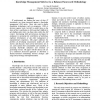Free Online Productivity Tools
i2Speak
i2Symbol
i2OCR
iTex2Img
iWeb2Print
iWeb2Shot
i2Type
iPdf2Split
iPdf2Merge
i2Bopomofo
i2Arabic
i2Style
i2Image
i2PDF
iLatex2Rtf
Sci2ools
82
Voted
HICSS
2002
IEEE
2002
IEEE
Knowledge Management Metrics via a Balanced Scorecard Methodology
IT professionals are finding that more of their IT investments are being measured against a knowledge management (KM) metric. Those who want to deploy foundation technologies such as groupware, CRM or decision support tools, but fail to justify them on the basis of their contribution to KM, may find it difficult to get funding unless they can frame them within the KM context. Determining KM's pervasiveness and impact is analogous to measuring the contribution of marketing, employee development, or any other management or organizational competency. This paper addresses the problem of developing measurement models for KM metrics and discusses what current KM metrics are in use, and examine their sustainability and soundness in assessing knowledge utilization and retention of generating revenue. The paper will then discuss the use of a Balanced Scorecard approach to determine a business-oriented relationship between strategic KM usage and IT strategy and implementation.
| Added | 14 Jul 2010 |
| Updated | 14 Jul 2010 |
| Type | Conference |
| Year | 2002 |
| Where | HICSS |
| Authors | Alea M. Fairchild |
Comments (0)

